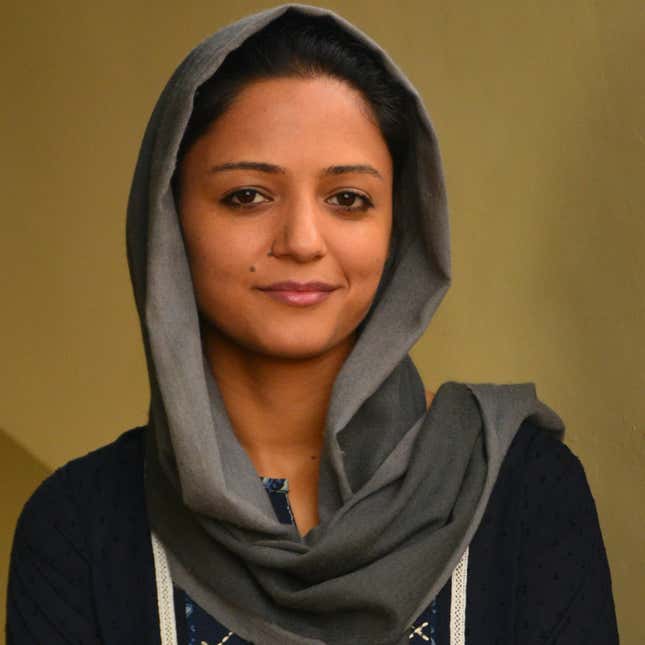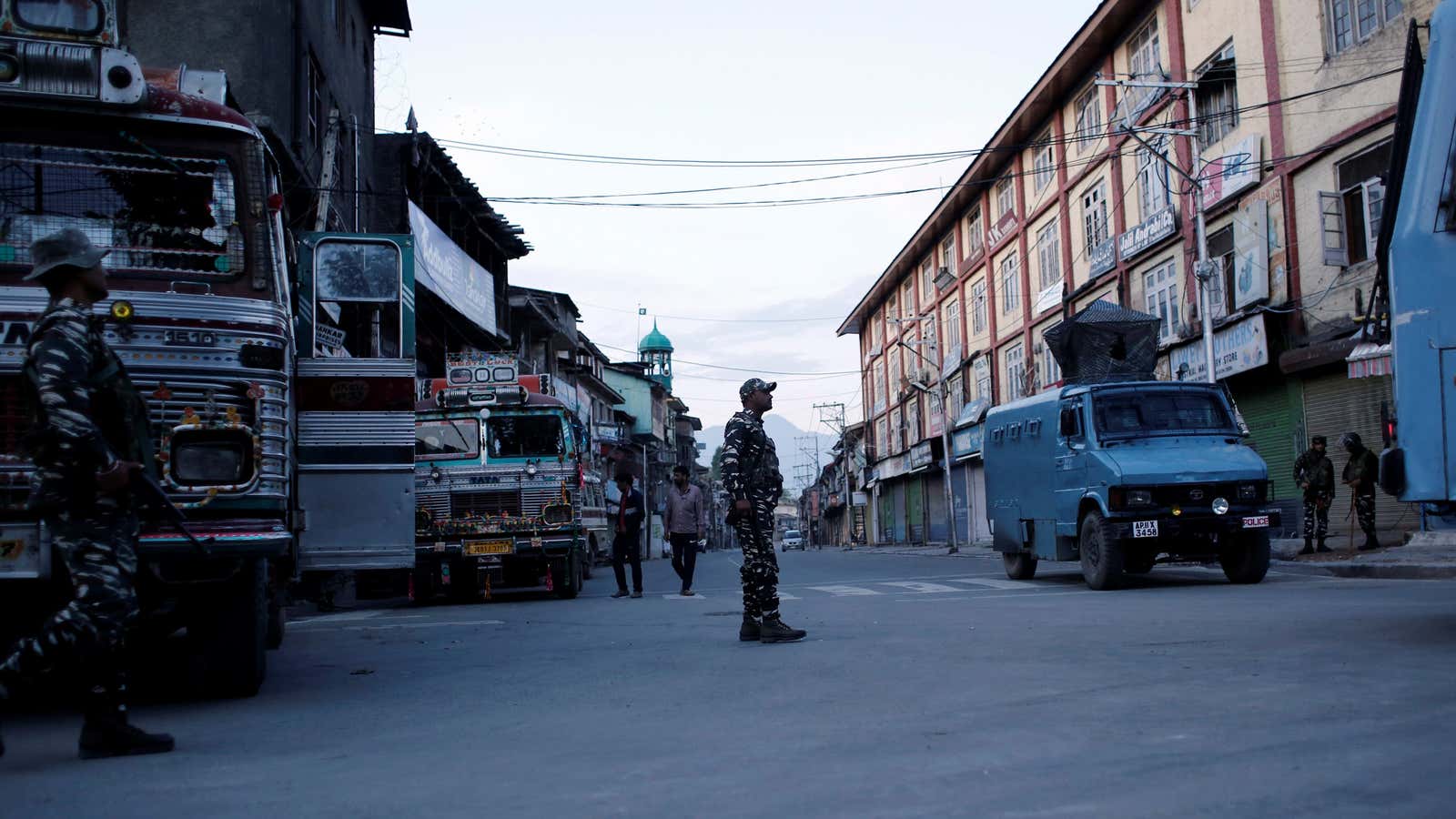The restive Indian state of Jammu & Kashmir is a contentious political issue, and anyone opining about it on social media needs a strong stomach for vitriol.
Shehla Rashid, politician, activist and former vice-president of the Jawaharlal Nehru University’s students’ union, is no stranger to such trolling.
This was painfully evident when the 31-year-old Kashmiri, a member of the Jammu & Kashmir People’s Movement (JKPM) party, wrote a thread on Twitter on Aug. 18. She tweeted about the situation in the state after a complete lockdown and internet ban was imposed following India’s scrapping, on Aug. 5, of a constitutional provision (Article 370) that gave the state special status and autonomy.
The most controversial tweet was one on the alleged torture of young Kashmiri men at the hands of the Indian armed forces.
This led to an immense backlash, after the Indian army denied Rashid’s allegations. A supreme court lawyer even filed a complaint with the Delhi Police against Rashid for purportedly spreading fake news. A news channel also tweeted a poll asking its followers whether the young politician should be arrested. This was, however, deleted after widespread criticism.
Rashid, though, remains unfazed. “If I have a narrow window to get information out, getting trolled is a very small price to pay for that.”
In an interview to Quartz, Rashid talked about the shades of politics in the Indian state today, the reaction to the abrogation of Article 370, and what it was like growing up in Kashmir at the height of militancy. Edited excerpts:
Why do you think you are being vilified on Twitter and elsewhere?
This vilification campaign is not happening in an isolated environment. This is happening in an environment where all of the Kashmiri leadership—mainstream, resistance, activists, educationists, and even clerics—has been arrested.

There is a systematic attempt to not let Kashmiris voice their concerns about the abrogation of Article 370 or their opinions about human rights violations.
There is also a whitewashing attempt by the government of India. They just want to tell everyone that all is well in Kashmir, people are happy with the abrogation, and there are only “some” miscreants, even though the arrests run into thousands. They want to create the impression that a handful of miscreants is misleading Kashmiris for its political benefits, probably funded by Pakistan.
You shared information on Twitter and people termed it “fake news.” How are you ensuring that your facts are accurate?
Fake news is when someone intentionally, with a (mischievous) purpose, spreads incorrect information. What I have written is not some propaganda. In an atmosphere where the state is stepping in to actively prevent documentation work, to prevent dissemination of information, this is as good or credible as it gets.
I obviously cannot conduct full due diligence, it is impossible. Journalists aren’t being allowed to report, especially the foreign media. The government has created a situation where we cannot verify information. I have never claimed that my tweets were based on first-hand information.
Why are you still on social media if the trolling is so vicious?
I am on Twitter because it isn’t about me. This is hatred for Kashmir. I am not taking it personally. So many leaders have been arrested, I can’t complain. If I have a narrow window to get information out, getting trolled is a very small price to pay for that.
You grew up in J&K in the 1990s. How would today’s situation in the Valley compare to that time?
I think this is worse than in the 1990s. When we were growing up, there was one big house in our neighbourhood that had a landline. So when some relative called, we would gather at the house. They would helpfully put their phone on speaker. But this is so much worse, even after the landlines have been restored partially. At least back then, there were paging services. Postal and telegram were reliable modes of communication.
Politically, it is too early to make a comparison with the 1990s. The crisis is still unfolding. We hear that for the next couple of months there might be no internet in Kashmir. At some point, the government is going to have to let people go out of their homes and ease the communication curfew. So, what’s going to happen then? The kind of reaction people may or may not have is extremely difficult to predict, especially when people have been rendered leaderless.
The JKPM is still a fledgling party. What are your plans for welfare work in the state?
Peace building can happen only when political leaders are released. It’s not as if I am representing a huge population. Any effort now will need many stakeholders on board and I don’t know how that will happen when all leaders are under arrest. What the government wants to do is install a new leadership with whom they can negotiate, etc. That has been the general approach of the central government throughout. Rebuilding efforts will require cooperation from the centre, and the centre has established itself as an entity not to be trusted again.
J&K always had shades of politics. Do you feel today it has simply boiled down to the binary of pro-government versus separatist?
There is a pre-Aug. 4 scenario, and there is a post Aug. 5 scenario that marks a very sharp differentiation between what politics used to be and what it is now. Before Aug. 5, we (members of JKPM) were involved in welfare activities in the state. I was personally working on education and the huge problem of school dropouts. I was helping families below the poverty line to help their children stay in school.
But now, the parameters of politics have changed completely. Now we have to talk about Kashmir in the international context, Kashmir as a nuclear flashpoint. The frame of reference has changed. This has halted any efforts of human development.
All categories among politicians have vanished now. There is no separatist, there is no mainstream politician. For instance, the mainstream would often talk about getting welfare work done, helping people get Aadhaar cards, or just looking at overall municipal works. But now, there is no difference between how a separatist would talk about the betrayals of India, and how a mainstream politician would.
What is the mood in Jammu, as opposed to the lockdown and reports of protests in Kashmir?
In Jammu, too, mobile internet has been banned ever since the curfew began. Television, newspapers, and general movement is largely normalised. But even in Jammu where the Bharatiya Janata Party is claiming that people are very happy, Section 144 (restricting public gatherings) was imposed. I was told that there were protests planned but because of the curfew, they couldn’t take place. But, at the same time, celebratory rallies were allowed. So clearly, this is a deliberate suppression of one kind of narrative and the promotion of another.
The general sense also is that more than Kashmir, Jammu is going to feel the heat of this policy change. There is a fear that there will be more changes in land ownership patterns in Jammu, or more “outsiders”.
The fact is, BJP’s own politicians have been talking about a domicile certificate that would allow jobs and land to be given to only Jammu residents. Similarly, BJP politicians in Ladakh have been talking about some kind of a tribal status for Ladakh, where outsiders cannot stake jobs, etc.
So basically, everyone is seeking a reversal to the Article 370 status, but it is only Kashmir that is being criminalised.
